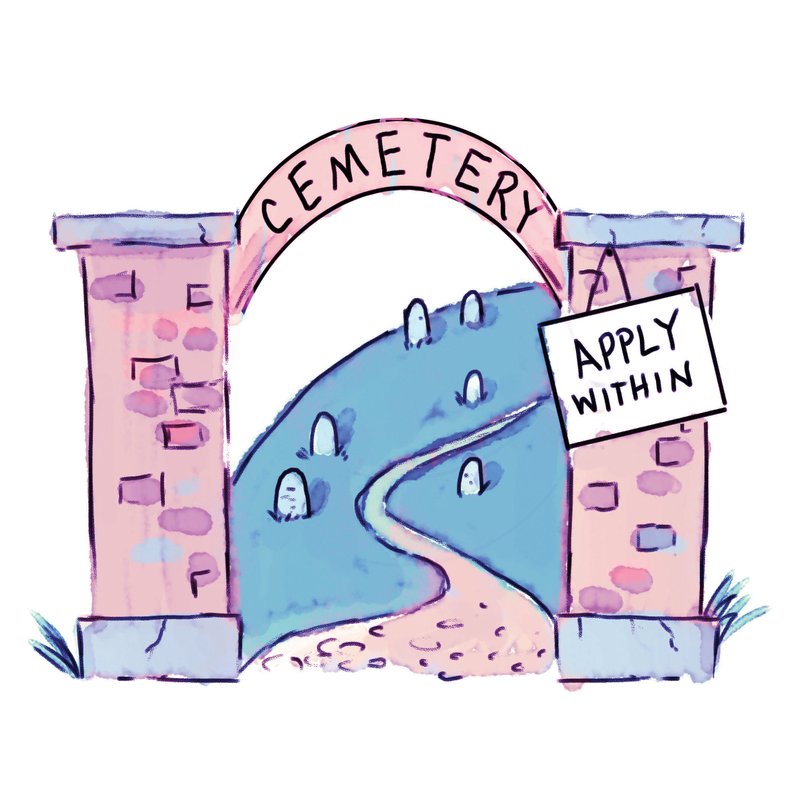I can remember only one time my mother used a word incorrectly. That's not a bad record.
After the spring quarter of grad school, I packed my things into a tiny Ford rental car and drove from Chicago to Buffalo, N.Y., where I had a summer internship.
I think I dared to let 18 hours or so pass without updating my mother on my trip. This was ages before cellphones or emails were part of our lives.
So Mom, in a panic, called the editor of the Buffalo News. She wanted to know whether he knew when my internment would begin.
I was her sixth kid, but apparently no offspring before me had taken an internship.
An internment is somewhat different from an internship, if all is well. An internment is one's confinement, such as a captive in a war.
It could have been worse. She could have called it an interment. That's when a dead body is placed into a grave or a tomb. I would never apply for an interment. There's just no future in it.
I thought of this unfortunate tale when my co-worker Tom reminded me of words that sound similar but have small or large differences. He used the example of "impractical" and "impracticable."
When something is impractical, it isn't realistic or wise, but with fortitude it might be accomplished. Something impracticable is simply impossible to carry out.
Imperial vs. imperious. Imperial simply means having to do with an empire or an emperor. Imperious has a snootier feel. It means arrogant or bossy.
Official vs. officious. The difference here is similar to the item above. Official means having some authority. Officious is when someone in authority is in your face about it.
Luxurious vs. luxuriant. Each word has "luxury" at its root. Luxurious is a more generic term for things that make you feel pampered, such as silk sheets or a cashmere sweater. Luxuriant refers to an area or thing with lots of greenery or vegetation. A garden can be a luxuriant refuge.
Dissatisfied vs. unsatisfied. The difference between these two is slight. When you're dissatisfied, it's more about emotions. You may be dissatisfied or unhappy or displeased with a tepid steak in a fancy restaurant. Unsatisfied describes a condition. Oliver Twist asked for more gruel because his hunger was unsatisfied.
Uninterested vs. disinterested. When you are uninterested, you are bored or simply not into something. Disinterested means you have no stake in something or are impartial.
Discomfort vs. discomfit. Something that discomforts you makes you uneasy or agitates you. Something that discomfits thwarts your plans. Suppose you are at work trying to give
a presentation to bigwigs. A fly buzzing around you will cause discomfort. A worker using a jackhammer right outside your window, drowning you out, discomfits you.
Obsolescent vs. obsolete. When something is falling out of use, it's obsolescent. When it is no longer in use, it's obsolete. These terms can be subjective, sometimes by generation. When my friend Lauren saw me looking at a paper map when I visited her in Los Angeles, she was in shock. "Google Maps," she said with authority. Maps on paper are obsolescent to me. They are obsolete to Lauren.
Politic vs. political. Action and people can be politic, meaning tactful, courteous, cordial. Political is engaging in government policy. On occasion, politics can be politic.
Historic vs. historical. Not surprisingly, both terms have to do with history. But historical is something that happened in the past. Historic is something from the past that had great importance.
Sources: Fowler's Modern English Usage by R.W. Burchfield (Oxford University Press, 2004), m-w.com, Oxford Dictionaries.
Bernadette Kinlaw is here to hear your grammar pet peeves, your word-usage questions and the punctuation issues that befuddle you. Email her at
ActiveStyle on 06/12/2017

